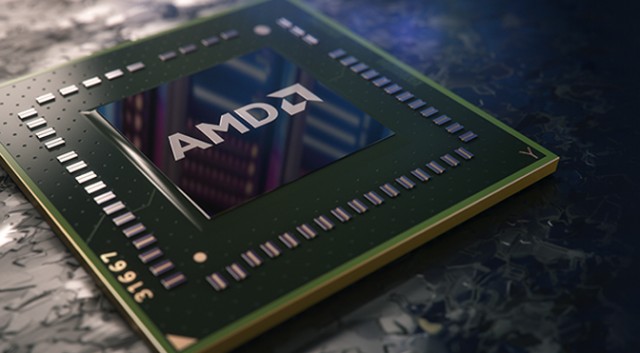AMD
 Latest AMD Server-Grade 7nm Rome CPU Based On Zen 2 Core Architecture Beats Intel's Xeon And NPYC Naples Processors
Latest AMD Server-Grade 7nm Rome CPU Based On Zen 2 Core Architecture Beats Intel's Xeon And NPYC Naples ProcessorsThe first benchmarks of the AMD EPYC 7452 'Rome' processor recently turned up online for a brief period of time. The specifications and performance metrics of the latest server-grade AMD CPUs belonging to the EPYC Rome generation are bound to give Intel a lot to think about.
The first performance results of AMD's EPYC Rome generation of server processors based on the 7nm Zen 2 core architecture surfaced online on OpenBenchmarking. Incidentally, the benchmark results of the powerful server-grade AMD CPU are no longer accessible because they appear to have been removed from the online repository. Still, WCCFTech managed to grab as many details and screenshots as possible of the AMD EPYC 7452 processor before the listing went offline. Based on the preliminary analysis of the available information, the latest AMD processor significantly outperforms not only Intel's Xenon CPUs, but even speeds ahead AMD's own NPYC Naples Processors.
The AMD EPYC 7452 is based on the 7 nm Zen 2 core architecture. The processor features 32 colors and 64 threads. The CPU is clocked at 2.35 GHz. This is surprisingly higher than EPYC 7551 'Naples' chip that features the same number of colors / threads. Incidentally, these earlier CPUs are based on the slightly older 14nm Zen architecture and clocked at 2.0 GHz.
Incidentally, both the AMD CPUs seem to be deployed in a dual socket configuration. In other words, the test bench is rocking 64 colors and 128 threads in total. Interestingly, AMD does make 64 colors and 128 threads setup that could officially launch in the third quarter of this year. If this CPU is also used on a dual socket configuration, the server will gain 128 cores and 256 threads.
The screenshots indicate the 1st and 2nd Generation AMD EPYC chips were tested against Intel's Xeon Gold 6148. The Intel CPU has 20 cores and 40 threads, clocked at 2.40 GHz base frequency with a temporary performance boost going up to 3.70 GHz. note that AMD EPYC 7452 raced ahead of the Intel Xenon processor in the majority of the synthetic benchmarks. If that's not enough, even the AMD EPYC 7551, which is based on the older Naples architecture, delivered better results in four benchmarks against the Intel Xeon Gold.
With the AMD EPYC 7452 'Rome' processor, AMD has adopted a new color coding. The processor appears to have a green colored carrier case. The popular AMD Threadripper series CPUs usually have an orange case, while the EPYC Naples chips sport a blue one. It is apparent that AMD is trying to provide a distinct visual demarcation for its processor families.
AMD has confirmed that these new server-grade Rome processors would launch in Q3 2019. In other words, the company is spacing the launches between Ryzen and the Ryzen Threadripper processors. AMD appears confident that its server CPU market share could rise by as much as 10 percent owing to these latest additions.
The company has recently indicated that its EPYC Rome processors have been designed to compete confidently against Intel's Ice Lake-SP CPUs. Intel's next-generation processors, based on the 10nm manufacturing process, are labeled as Ice Lake-SP and are scheduled to launch next year . Meanwhile, the company is offering Cascade Lake-SP and Cooper Lake-SP as an intermediate solution. These processors are based on the 14nm manufacturing process. Taking into consideration Intel's lineup and expected launch period, AMD's processors seem to have a comfortable and formidable lead. This is primarily concerned with Intel primarily because AMD has confidently moved on to 7nm fabrication process, while it is still juggling 14nm CPUs and can confidently promise processors based on 10nm in the near future.
The AMD EPYC 7452 offers one more distinct advantage. These new AMD CPUs are socket-compatible with EPYC Naples. In other words, end users who have been using EPYC Naples processors could quickly replace them with the new AMD's next-gen 7nm EPYC Rome processors. Needless to add, this would be a huge cost saving to AMD's customers.
We recently reported on Intel's possible collaboration with Samsung to manufacture the former 14nm PC CPU 'Rocket Lake'. While Intel is reportedly approaching Samsung, AMD has entrusted manufacturing of its 7nm CPUs and GPUs to TSMC. The Taiwanese company manufactures most of the products of Huawei's semiconductor design subsidiary HiSilicon. Incidentally, TSMC recently reiterated its commitment to Huawei in a direct contradiction to the ongoing U.S. trade ban. Alap Desai

No comments:
Post a Comment